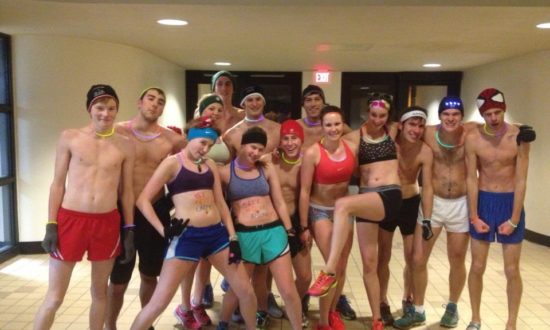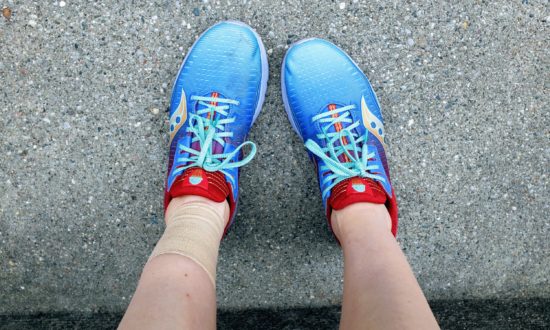Let me just start this whole thing off with a standing ovation. For you, for your decision, your gumption, your tenacity, for the marathon itself. Take a moment to imagine that standing ovation, you’ve earned it.
Now, for the hard part.

I do actually think there are some people out there who say making the decision to run a marathon is the hardest part. Those people would be wrong. No, the hardest part is the training. The brutal, relentless training. Through temperature extremes, hills, blisters, missing toenails, and chafing so bad it will leave scars.
Seriously, you’re going to have the time of your life.
People also say that you can’t train for and run a marathon without it changing your life. These people would be absolutely correct. This thing that you just decided to do – it’s going to change your life. No way around it. Even if you’re just looking to finish, the marathon demands all you have to give. You’ll have moments when you feel like you’re dying and moments when you have never felt so alive.
And no, that’s not cheesy. That’s damn inspirational.

So this particular post is for those of you who are venturing forth on their very first marathon journey. Your goal is to finish and not die trying. This if for you folks who run every once and awhile, but would never dream of calling it a passion or obsession (yet).
If you’re a fairly seasoned runner who dabbles in speed work and regularly gets in around 20-30 miles a week, this post is not for you. But for all you couch-surfers, power-walkers, and annual turkey-trotters, this post is all about you. Following this plan probably won’t win you any age group awards, but it will get you to the finish line.
I’ve included a 16-week (not including race week) training plan and a nifty little FYI page at the bottom of this post that you can use as a guide on the road to your first marathon. Feel free to adapt it to best suit your needs (which does not mean slashing the weekly mileage in half, by the way).

There’s so much to unpack when it comes to marathon training, I honestly am a little unsure where to start. I think that also has something to do with how excited I am for you. So I guess I’ll start at the beginning. That’s where you’ll be starting your marathon, after all (just in case you didn’t know).
- Don’t get too excited. Seriously, you have a long stretch of training in front of you and it would be a huge bummer if you had to miss some of it because you went out and got yourself shin splints. Don’t be that guy. Follow the training plan and just take it easy. There will be so many more miles to run. Come week 14, you’ll be wishing things were this easy.
- When you start incorporating your workouts into your daily schedule, there may be a week or so of trial and error. Give yourself a chance to adjust and pay attention to how your body reacts to your new lifestyle. You’ll learn how much water you need to drink throughout the day, when the best time to eat is before and after running, what routes make the most sense, how to best deal with sweaty gym clothes sitting in your car all day, etc.
- Sleep is your new best friend. Get as much as it as you can during training (naps are legit) to give your body the chance it needs to recover properly. Also, take the time to stretch. I don’t always practice what I preach… But you can make stretching interesting and engaging with yoga or a foam roller.
- Unfortunately, training for a marathon does not give you the excuse to eat whatever you want. Quite the opposite, actually. Nutrition is vital to performance. If you’re putting junk in the tank, your runs will be junk as well. It doesn’t mean kale salads are on the menu for dinner every night, but being mindful of what you put in your body will only help your training.

Your efforts will be rewarded with a shiny medal and a large pile of smelly clothes. - You may have gotten along just fine with a pair of running shoes from the discount rack at Kohl’s, but we’re gonna have to step it up a notch for marathon training. The internet is full of shoe reviews, so take some time to find a brand and style that work for you. If you have a local running store or sporting goods store, stop in for a shoe fitting. You and these shoes are going to be together through a lot, so you want to make sure you’re a good fit for each other.
- Also, invest in some high-quality running apparel. The last thing you want to do is run 18 miles in a cotton t-shirt and socks that came in a discounted bundle. Shop for moisture-wicking, non-cotton clothes that will repel sweat and help your body breathe. Get some socks made for running to ward off blisters and bloody ankles. Maybe pick up a running hat or a pair of running sunglasses if you find yourself squinting at the sun. These things are far less important that your running shoes, so if money is a little tight it’s better to run in cotton than run in the wrong shoes.

The curse of cotton socks. - And if you have more money than you know what to do with, why not get yourself a GPS watch while you’re at it? Yes, these can cost you a couple hundred dollars, but it will last you years and countless runs. Obviously, you can train for a marathon old-school by running familiar routes or using Map My Run to map our your route ahead of time. However if you’re bad with directions like I am, you may want to go with the GPS watch. Or you can do what I did before my GPS watch and write down all the directions on my arm. Worked really well until they all started to bleed together thanks to my general sweatiness.

Running is funning. - The most important part of your training will be your long runs. Treat these as practice marathons. Try to run them around the same time of day of the actual marathon so you know how your body will respond. Practice taking nutrition and hydrating so nothing is a shock to your system come race day. Pace yourself on these runs and try to use this time to find your right headspace. You’re going to be out there for a while come race day and you certainly want to be mentally prepared. It’s just as important as physical preparedness.
- Buy Body Glide or something like it. Your chafe-able parts will thank you.
- It’s oh-so-tempting to start comparing your training to those around you. But you are on your own journey unlike anyone else’s. No matter how fast or slow you run, you are still achieving something great. That’s what makes the marathon so special.
People have written entire books on first-time marathon training, so obviously I haven’t covered everything. Most of the wisdom you’ll gain will be picked up mile after mile. All that’s left to do is get out and run.




